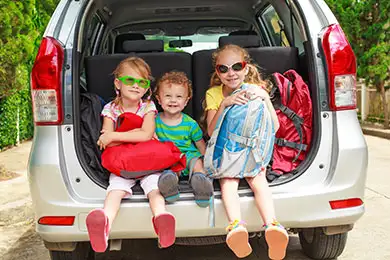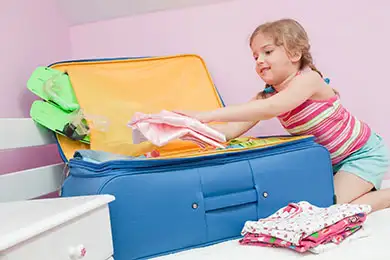
While traveling with a child with special needs may require a little more planning and adjustment, it’s just a different category of family vacationing that, just like traveling with infants, toddlers and teens, can be both difficult and enjoyable. Here are ways to make the trip easier and fun for the entire family.
PLANNING
When traveling with a child with special needs, begin with ensuring the basics are covered.
Air Travel. When booking flights, select seating at the front of the plane, as well as closer proximity to lavatories for easier on/off and in/out. Request wheelchair assistance upon arrival, and seek out wheelchair-accessible security lines, both of which will help you better maneuver the airport. If security screening is a concern, hand searches, as well as private screenings, may be requested for disabled passengers. If you have questions about traveling with special needs children, we recommend first contacting the carrier with whom you intend to travel, rather than the airport from which you’ll be departing.
Transportation. Rental car agencies are catering to families of all types, including those in need of modified cars and vans with room for wheelchairs, lifts and specialized seats. In large cities, most taxi companies offer a select number of wheelchair-friendly cabs, such as Houston’s Yellow Cabs. Request a list of taxi companies through your hotel and contact them to schedule wheelchair accessible taxis for airport and attraction transportation.
Another popular option for families traveling with special needs children is traveling by shuttle bus. Shuttle busses are larger and usually better-equipped for handicapped passengers than the average taxi, but, as expected, offer less privacy, as well as less control over where you’ll stop and when you’ll get to your destination. Contact your hotel to see what options are available.
Hotels. All U.S. hotels are required to offer wheelchair-accessible rooms, where doors are wider to the room and bathroom, and grips are provided for tubs and toilets. Be sure to request these special rooms well in advance of your stay. Some may also provide shower chairs, upon request.
However, not all international hotels may be so friendly. Be sure to thoroughly review hotel websites and reviews, and contact them directly to be certain. Also be sure to inquire about elevators, as some resorts may not offer elevators, in which case ground-floor accommodations are recommended. Stairs need to be considered for resorts offering bungalows — while quaint mountaintop accommodations overlooking blue seas are gorgeous, they may not be wheelchair accessible.
PACKING

Anticipating problems before they occur can eliminate stress in the event a problem does occur. When packing, don’t forget:
Medications. Pack all medications in carry-on luggage in case checked bags are delayed or lost. Most liquids must meet the traditional 3-1-1 rule for carry-on luggage, which requires that passengers place liquids in a container with a capacity no more than 3.4 ounces, in one zip-top sealable bag, and each passenger may only have one bag for liquids. However, liquid medication is one of very few items (including baby formula, baby food and breast milk) which may be allowed in higher quantities, if declared beforehand and approved during the screening process. Bringing a note from your doctor on the medications may come in handy, as would an extra prescription in case one must be filled.
Insurance. Check with your insurance company to be sure your child is covered when traveling to different states and abroad, as well as a list of facilities that are covered in the destinations you are visiting — including cruise ships — in the event you must visit a doctor. If insurance is not covered, consider purchasing travel insurance that may assist with unexpected costs. Make a copy of your insurance information, physician’s contact information and emergency contact list.
Purchasing travel insurance for a big-splurge trip may be something to consider, as well, in the event illness or trouble arises pre-trip that makes your family have to cancel or reschedule.
Carry-on. If your child has frequent accidents, bring a full change of clothes in a carry-on.
Familiar Items. For children who may become stressed, anxious or confused in new situations and places, traveling can be quite the disruption to the familiar and safe. To help avoid fits, bring familiar and beloved items from home, such as pillows, blankets and toys. Try to focus on things that will distract and even relax your child, as opposed to things that may overexcite him or her.
Noise-canceling Headphones. If loud noises are troublesome to your child, noise-canceling headphones can help drown out noises on planes and crowded subways. MP3 players with your child’s favorite music can take their minds off of unsettling crowds and places.
WHERE TO GO

Major attractions across the U.S. work hard to appeal to families and meet ADA requirements. Some may even offer special mobility equipment and wheelchairs to assist families, and calling ahead will help determine if there are any special restrictions or programs specifically for special needs families. Finding a vacation that accommodates every family member’s interest may be easier than you think.
City Travel. The cities most often visited by travelers are often the best for special needs travelers, as well. Many offer travel guides through their Visitors & Convention Bureaus, and these may include guides for people with disabilities, which can help you pre-plan your vacation, or look into last-minute information when you stumble across an attraction during the trip.
For example, Charleston Area Convention and Visitors Bureau’s website offers detailed travel support that lists the popular attractions and whether they can accommodate disabled visitors. Its listing for Boone Hall Plantation, for example, lets you know ahead of time that while entrances are ramped and the property is suitable for motorized wheelchairs, only the first floor is accessible by wheelchair and elevators are not offered.
Theme Parks. Catering to kids is a theme park’s business, and thankfully, many theme parks have made parks friendly to those with special needs. Disney, of course, reigns supreme in accommodating special needs families, making it easy for kids to enjoy every attraction. The Disabilities Access Service Card also helps families avoid long lines, and many parks have followed in Disney’s footsteps with similar offerings. SeaWorld San Diego is another excellent choice for special needs children, with their Ride Accessibility Program to ensure guests are given equal access to every ride and attraction. They also offer their Special Access Pass to people who can’t easily wait in line due to their disabilities.
Cruises. The newer and larger cruise ships, such as Princess, Carnival and Norwegian’s Breakaway work hard to accommodate guests with special needs, from offering wheelchair-friendly staterooms, public areas and swimming pools, to providing shore excursions geared toward those with special needs. Royal Caribbean received the very first “Autism Friendly” certification by Autism on the Seas in February, 2014. For a list of the best ships for cruisers with disabilities, visit our sister site, Cruise Critic.
National Parks. America the Beautiful and its breathtaking National Parks are available to everyone, especially those visitors with special needs. Many parks provide visitors with things like special wheelchair-accessible trails, auto tours and observation areas. Visit the websites of the National Park you’d like to visit for more details on their disabled accessibility to ensure it meets your needs. The America the Beautiful National Parks and Federal Recreational Lands Pass Access Pass is a free, lifetime pass to the National Parks, given to disabled travelers. The passes provide free admission, as well as discounts on amenity fees such as swimming and camping.
Other ways to avoid inconveniences while traveling with special needs children are to prepare your child for traveling before the trip. Try discussing where you are traveling and what the child will encounter each day, and sticking to routines once traveling. Just as a toddler needs naptimes to ward off tantrums, sticking to your at-home routine as much as possible can ease tension for a child with special needs. Remember to move at your child’s pace to be sure he or she enjoys the trip and, most importantly, that the entire family enjoys their time together.
Here’s our list of the Best Special Needs Vacation Spots for families.
Visit our Forums for more tips, advice and discussions about Travel for Families with Special Needs.
Visit our sister site, Independent Traveler, a comprehensive online travel guide, for more tips on disabled travel, as well as a special section on a traveling with dietary restrictions.
Article updated as of 01/24/2014
Our team of parents and travel experts chooses each product and service we recommend. Anything you purchase through links on our site may earn us a commission.






